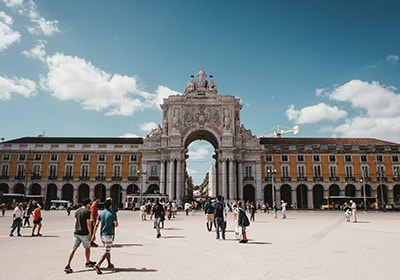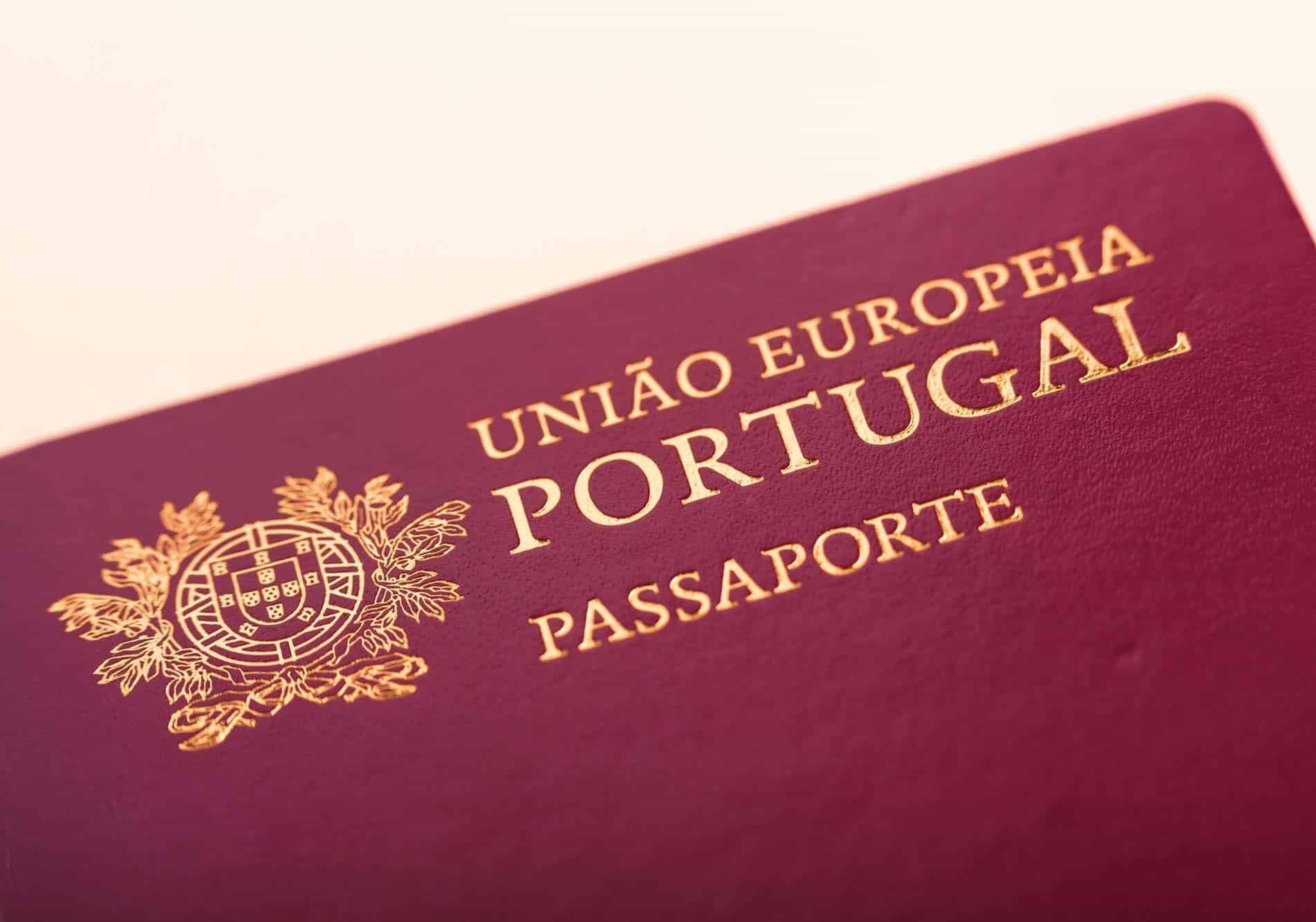
In this article, we’ll explain the various types of Portuguese visas you can apply for, help you decide which option will be better suited to your circumstances, and uncover the visa options if you want to move to Portugal temporarily as a digital nomad or long-stay resident.
In this article, we’ll cover how to immigrate to Portugal in 2025 and the following:
Who needs a visa to immigrate to Portugal?

Visas are processed by the Portuguese Embassy, Consulate, and VFS Global in your country of residence, while residency visas are issued by the Portuguese Agency for Integration, Migration, and Asylum (AIMA) through Immigration and Border Services.
The first step for non-EU nationals immigrating to Portugal is to apply for a visa that aligns with their circumstances and goals. Some visa options available include the Portuguese Golden Visa for investors, the D8 Visa for Digital Nomads, and the Portugal D7 Visa for passive income earners. Once the visa is approved, foreigners can legally enter Portugal.
The United States, Canada, Australia, New Zealand, and the United Kingdom have international agreements with Portugal, allowing nationals to enter and stay in Portugal for 90 days within six months without needing a visa. However, non-EU nationals who want to stay longer than three months must apply for a long-term visa.
After arriving in Portugal, the next step is to apply for a temporary residence permit, allowing you to live there. After residing legally in Portugal for five years, you can apply for a permanent residency permit and Portuguese citizenship.
However, EU nationals can enter Portugal simply by showing their identity cards. However, they must request a registration certificate if they intend to stay longer than three months. After five years of living in Portugal, European citizens can obtain a permanent residence certificate.
Required documents for non-EU citizens to obtain a Portuguese residency visa
- A valid passport with a validity of at least three months beyond your intended stay
- Two passport-sized photos
- Completed visa application form
- Valid travel insurance coverage
- Proof of financial means to support yourself during your stay
- Clear criminal record
- Supporting documents to verify your visa application
- Alternatively, a Portuguese citizen or resident can sign a term of responsibility on your behalf
The Four Main Categories of Portugal Visas
Portugal visa entry requirements depend on your situation and citizenship. AIMA Portugal issues either a temporary stay visa or a long-term residency visa. Below are the main categories of Portuguese visas.
 Schengen Visa
Schengen Visa

To be eligible, you must submit the necessary supporting documents and demonstrate that you have sufficient means of subsistence to support yourself during your visit to the Schengen region.
Depending on your situation, you might also need to consider a residence permit if you plan to stay beyond the short-term limits or a different Visa type based on your travel purpose.
There are several types of Schengen Visas:
- Airport Transit Visa (Visa A): This permits transit within the Schengen area of an airport from one flight to another. Unless exempted, this visa is required for passengers who change flights at the Schengen state and country airports.
- Transit and Short–Term Stay Visa (Visa C): This visa is issued for transit and short-term stays in the Schengen region, valid for 90 days within a six-month period. The most common types of short-stay visas include the Portuguese tourist visa and the business visa.
- Limited Territorial Validity (LTV) Visas: This is a special short-stay visa allowing travel to only one Schengen state or other Schengen states as specified beforehand.
 Temporary stay visa
Temporary stay visa
The Portugal temporary stay visa allows for a four-month stay with multiple entries. This visa is granted for various situations:
- Receiving medical treatment
- Accompanying a family member undergoing medical treatment
- Transferring workers between countries within the World Trade Organisation (WTO) to provide services or professional training
- Temporary employment or self-employment
- Conducting scientific research or teaching at a higher education institution
- Pursuing sports activities
 Portuguese residency visa
Portuguese residency visa
The Portugal residency visa is for individuals aiming to stay in Portugal longer. It is granted after arriving in Portugal for several purposes, including:
- Employed work
- Self-employment or entrepreneurial activities
- Scientific research or teaching
- Study, student exchange, internship, or voluntary service
- Higher education programs (for students already residing in Portugal who want to further their studies)
- Family reunification
- Pensioners and people with an income
This visa allows multiple entries to other Schengen countries. Upon entering Portugal, you must apply for a residence permit, regardless of the type of Portuguese residency visa you receive. Visas such as the Portugal Golden Visa, the D8, and the Passive Income Visa all pertain to this category.
 Portugal work visa
Portugal work visa
Whether you need a Portugal work visa depends on your nationality and the length of your employment. For non-EU nationals, the following national visa options are available:
- Short-Term Work Visa: This visa applies to work contracts lasting less than six months and is available to both employees and self-employed workers. It can be extended for up to a year.
- Long-Term Portugal Online Worker Visa: This is necessary for non-EU nationals with long-term work contracts in Portugal. It is classified as a type D Schengen Visa, allowing visa-free travel across the Schengen zone.
The 5 Best Portuguese Visas in 2025
If you’re a non-EU citizen looking to acquire long-term residency in Portugal, several Portugal visa programs are available, which we detail below.
Portugal Golden Visa

The Golden Visa program is particularly attractive to Americans, who benefit from Portugal’s lower cost of living compared to major US cities like New York and San Francisco. Also, Portugal’s economy and favorable tax incentives for foreign income make it desirable to live in.
To qualify for the Portugal Golden Visa, applicants must:
- Maintain a clean criminal record. Legal consultation is recommended if necessary.
- Be a non-EU, non-Swiss, or non-EEA national.
- Invest at least €250,000, with several Portugal Golden Visa investment fund options available.
- Spend an average of 7 days per year in Portugal, totaling 14 days during each 2 years of the residence permit’s validity.
The Golden Visa application process involves submitting necessary documents and undergoing an assessment by Portuguese immigration and border services. Successful applicants and their families receive a Portugal residence permit, allowing them to live, work, and study in Portugal and travel freely within the Schengen states. Family reunification is also possible, allowing family members to be included in the visa application.
Foreign residents can apply for permanent residency and Portuguese citizenship after maintaining the investment for five years and complying with Portuguese law. Following Brexit, UK citizens are treated as third-country nationals and can apply for the Golden Visa. This provides a pathway to Portuguese residency and potentially citizenship, allowing UK citizens to maintain ties with the European Union.
D2 Startup Visa
The Startup Visa is open to non-EU residents or people not residing in the Schengen area. This visa is for entrepreneurs who want to attract investments to Portugal. Applicants can either have an existing business they wish to expand to Portugal or a new project they intend to create within the country. To qualify for the D2 Visa Portugal, entrepreneurs must have their business approved by the IAPMEI body before applying for a startup visa.
D7 Visa
The Portugal D7 Visa is an attractive visa that allows non-EU citizens to get Portuguese residency, provided they have enough funds to support themselves during their stay in Portugal. This is perhaps the best route to immigration with a zero-investment pathway for expats.
Also known as the Passive Income visa, the D7 is geared toward retirees, self-employed individuals, and entrepreneurs who want to live in Portugal and enjoy the country’s high quality of life without committing to a major economic investment. However, you’re required to have a passive income that meets regulations.
The D7 Visa can then be renewed and turned into a permanent residence permit after five years. After five years of holding the D7 Visa, you can also request Portuguese nationality, provided you fulfill the other requirements stipulated by Portuguese nationality law.
D8 Visa – Digital Nomad Visa Program
The Portugal Digital Nomad Visa, officially known as the D8 Visa, was introduced by the Portuguese government in 2022. This visa is specifically designed for digital nomads, including freelancers, remote employees, self-employed individuals, and entrepreneurs who wish to acquire a residence permit and live and work in Portugal.
Eligibility for the Digital Nomad Visa includes:
- Non-EU nationals: The visa is available to foreign citizens who do not belong to the European Union.
- Income requirements: Applicants must demonstrate sufficient income, at least four times the Portuguese minimum wage.
- Residential property: You must rent or purchase residential property in Portugal, providing proof through a rental agreement or property ownership documentation.
The D8 Visa allows for multiple entries into Portugal and provides the opportunity to apply for a residence permit. The residency permit can be extended for up to five years. For those intending to stay for less than a year, the temporary stay visa may be a suitable option – offering a maximum validity of one year.
With the Digital Nomad Visa, remote workers can enjoy the benefits of living in Portugal, with the flexibility to renew their residency status as needed. This visa ensures that digital nomads have the means of subsistence to support themselves during their stay within Portuguese territory.
To qualify, you will need to make four times Portugal’s minimum wage or more, which totals €3,480.00 per month.
Portugal Tech Visa
The Portuguese government introduced the D3 Visa Portugal (Tech Visa) to attract highly qualified tech talent to Portugal. Nationals from countries outside the Schengen Area can apply, provided they meet the following requirements:
- The applicant must be a third-country national who does not reside in the European Union.
- All tax obligations must be fulfilled.
- The applicant must have a clean criminal record and be at least 18 years old at the time of the Portugal visa application.
- The applicant must have completed a Bachelor’s degree or equivalent level 6 according to ISCED 2011, or level 5 (tertiary-level education) with five years of experience in specialized technical functions.
- The applicant must hold proficiency in Portuguese, English, French, or Spanish appropriate to the functions/duties to be performed.
Family Reunification Visa
Also known as the Family Reunification Visa, the D6 Visa Portugal allows family members of foreign nationals who are legally residing in Portugal to join them.
If you have come to Portugal on another visa, like the D7 Visa or the D2 Visa, or have settled status as an EU citizen, you can apply for a D6 to bring your accompanying family member.
Visa applications for the family regrouping can only be made by someone who holds a Portuguese residence permit and is already legally living in the country.
The process may require the Portuguese visa holder to demonstrate the relationship, prove they have the financial means to support the family members and meet other eligibility criteria.
Portugal Immigration Requirements

Visa processing time for Portugal can range from two weeks to two to three months, so start your application process early.
Documents required for a Portugal visa include:
- Two passport photos
- Your passport and copies of previous visas
- A copy of your return ticket reservation (depending on nationality)
- Travel insurance for the Schengen Area
- A cover letter detailing the purpose of your visit and itinerary
- Flight dates and times
- Accommodation plans for your stay
- Sufficient funds for the duration of your stay
- Proof of civil status
- Proof of economic status to prove means of subsistence
Additional documentation may be required based on the nature of your visit to the Portuguese territory. For instance, if you are a student, provide proof of enrolment at a Portuguese institution.
What are the requirements for Portugal citizenship by naturalization?
Foreign nationals can obtain Portuguese citizenship through naturalization after residing in Portugal for more than five years. The first step in this process is to secure a permanent residence permit. Once you have this, you can pursue Portuguese citizenship, which also grants you European Union citizenship and access to an EU passport.
The steps to achieve this are outlined below:
1. Obtain a Portugal permanent residence permit

Here’s what you need to know about the Portugal permanent residency requirements, including all documents required:
- Valid Residence Visa: Ensure your residence visa is current and valid.
- Passport or Travel ID: A valid passport or travel ID is required.
- Two Passport Photographs: Recent passport-sized photos are needed for identification purposes.
- Proof of Financial Stability: Show that you have sufficient funds to support yourself.
- Proof of Accommodation: Documentation proving you have a place to live in Portugal.
- Travel Insurance with Medical Treatment Coverage: Insurance that includes medical treatment is necessary.
- Criminal Record Certificate: A certificate showing that you have a clean criminal record.
- Proof of Enrollment in Social Security: Obtain a Social Security Number (NISS) to show your registration.
- Evidence of Tax Status: You will need a NIF (tax number) to demonstrate your tax status.
- Proof of Legal and Uninterrupted Residence: Evidence of continuous legal residency in Portugal for the past five years.
- Portuguese Proficiency: Provide a certificate of qualification or proof from a language assessment center to show basic proficiency in Portuguese.
Please note that additional Portugal immigration requirements may apply. By meeting these requirements, you can secure your status as a permanent resident in Portugal and enjoy all the benefits that come with it.
2. Get your Portuguese citizenship and passport
In case you have legally resided in Portugal for five years through one of the abovementioned visas, you’re allowed to request Portuguese citizenship through the naturalization route. You must first obtain a long-term residence permit. Then, you can apply for Portuguese nationality and obtain a Portuguese passport.
For those applying through the Portugal Golden Visa program, citizenship may be possible after five years, provided that applicants maintain their investment and meet the program’s residency requirements.
When being granted European Union citizenship, you’ll have the same rights and privileges associated with being a Portuguese national, including the ability to live, work, and travel freely within the European Union.
Is dual citizenship allowed in Portugal?
Yes, Portugal does permit dual citizenship, so you can hold Portuguese citizenship alongside that of your home country. However, it’s important to verify the dual citizenship policies of your country of origin to ensure that acquiring Portuguese citizenship won’t affect your existing citizenship status.
If both Portugal and your home country allow dual citizenship, you can enjoy the benefits of being a citizen of both nations without any issues.
Portuguese Language Requirements
Passing a basic language test is required for citizenship applicants from countries where Portuguese isn’t the main language. However, for applicants from former Portuguese colonies (Angola, Mozambique, Cape Verde, and others), a Portuguese test may not be necessary.
While proficiency can be proven in several ways, the most popular is the A2 Portuguese language exam, which results in the CIPLE (Certificado de Português Língua Estrangeira). This exam assesses applicants’ proficiency in Portuguese as a foreign language.
Taxes in Portugal for Expats

The primary tax you need to understand is personal income tax, which applies to the earnings of both Portuguese residents and non-residents who generate income in Portugal. Taxes are typically deducted automatically from pay slips; however, you are still required to complete an annual tax return.
This tax return involves calculating your taxable income, applying the appropriate tax rates, and accounting for any legal deductions such as education or health-related expenses.
Income Tax Rates and Filing
The Individual Income Tax (IRS) in Portugal is calculated based on your income and is charged at rates ranging from 13% to 48% for the year 2025:
- Employment Income
- Self-Employment Income
- Investment Income
- Rental Income from properties located in Portugal
- Capital Gains from selling properties, assets, or shares
- Pensions received in Portugal, including private pension plans
While IRS is calculated individually, couples and civil partnerships have the option to file jointly. In this case, tax is assessed on the total taxable income of the household members.
Non-Habitual Residency (NHR) Program
Since 2009, many expatriates in Portugal have benefited from the Non-Habitual Residency (NHR) program, which has provided significant tax advantages. However, the NHR program ended on January 1, 2024. However, the NHR program ended on January 1, 2024. Individuals who met specific criteria could still apply for the program until March 31, 2025, but that option is no longer available.
The NHR scheme has been succeeded by the Tax Incentive for Scientific Research and Innovation (IFICI), which you can discover more about in our article, Portugal’s New NHR in 2025: A Guide to the NHR 2.0 (IFICI).
Why choose Global Citizen Solutions for your Immigration Visa?
GLOBAL APPROACH BY LOCAL EXPERTS
- GCS has offices located across Portugal.
- Members of the US-Portugal and UK-Portugal Chambers of Commerce in Portugal, and the Investment Migration Council (IMC).
- Our expert team can help you throughout your journey to secure your Visa.
100% APPROVAL RATE
- Our successful track record in applications provides reassurance to applicants.
- We have helped clients from more than 35 countries secure residency in Portugal.
ALL-ENCOMPASSING SOLUTION
- With a single channel of communication, our approach ensures that you have complete clarity on your application.
- Our BeGlobal® Onboarding System allows for a total flow of information.
TRANSPARENCY AND PRIVACY
- Our pricing is clear and detailed, you will not face any hidden costs.
- All data is stored within a GDPR-compliant database on a secure SSL-encrypted server.

Frequently Asked Questions about Portugal Immigration
How does Portuguese immigration work for non-EU nationals?
Non-EU nationals must usually apply for a Schengen Visa to stay in Portugal legally and explore the Schengen region. However, nationals from the US, Canada, Australia, New Zealand, and the United Kingdom can enter Portugal and circulate freely for the first three months without a visa.
However, afterward, they’ll need to apply for some kind of visa extension of residence permit.
How to become a permanent resident in Portugal?
You must live in Portugal for an uninterrupted time of five years to qualify for a Portuguese permanent residence permit, as well as prepare all the necessary documentation and submit a test proving your Portuguese language proficiency.
What Portugal visa lets me become a permanent resident?
You can choose between the D7 Visa or Portugal’s Golden Visa scheme to live in Portugal, with the Golden Visa requiring a qualifying investment. Additionally, explore other visa options like the D2 Visa for entrepreneurs, the Digital Nomad Visa for remote workers, the Portugal Qualified Worker Visa, and the Portugal Self-Employment Visa.
What is the Portugal Golden Visa?
The Golden Visa is a residency-by-investment program that allows foreign investors to legally live in Portugal by making a qualifying investment. Key benefits include minimal residency requirements—just an average of seven days per year to maintain the residence permit—and a five-year route to Portuguese citizenship, which offers European Union citizenship. Launched in 2012, the program has successfully attracted several billion Euros in investment from over 12,000 applicants.
How does getting residency in Portugal work?
To get residency in Portugal, you must first enter Portugal with a valid visa for the duration of your stay. Afterward, you must lodge your residence visa for Portugal application with the immigration agency in Portugal, AIMA (Immigration and Border Services).
What is a temporary residence permit for Portugal?
A temporary residence is a document issued by AIMA allowing a third-country national to live in Portugal. This document is valid for a period of two years and is renewable for successive periods of three years. It is not to be confused with a temporary or short-stay visa, often issued to travelers or people looking for medical treatment.
What are the Portugal residence visa requirements?
You need a valid residence visa, passport, and two passport photographs to apply for a Portugal residence visa. You must also provide proof of sufficient finances to support yourself, accommodation proof, and medical insurance. Additionally, a clean criminal record, proof of enrolment in social security (with a NISS number), and evidence of tax status are required.
Do I need a visa to enter Portugal?
You need a visa to enter Portugal if you’re a third-country national (non-EU/non-Swiss/non-EEA). The type of residence permit or visa you will need will depend on your circumstances and home country. Passport holders of the EU can freely arrive in Portugal without the need for a visa.
How many types of visas are there in Portugal?
There are usually three categories of Portugal Visa types:
- A short stay visa, known as a Schengen Visa. These are valid for up to 90 days.
- Temporary stay visas, which are valid for up to a year in most cases.
- Long stay visas, also known as residency visas. These are for stays of one year or more.
Which is the best visa for Portugal?
There’s no single “best” visa; the ideal option depends on your goals for moving to Portugal. For instance, the D7 Visa is ideal for retirees, while the Digital Nomad Visa suits remote workers.
If your goal is employment, various work visas are available, and the Golden Visa is a top choice for those looking to invest and secure residency. Entrepreneurs should consider the D2 Visa for their needs.
What is a Type C Visa in Portugal?
A Type C Visa or short-stay visa allows individuals to transit through or stay in the Schengen Area for up to 90 days within a 180-day period. If you have this visa type, you will be able to transit through international transit areas in airports that are located in the Schengen Area.
What are the immigration policies for Portugal in 2025?
There are several ways to secure residency in Portugal, including the D7 Visa, the D8 Digital Nomad Visa, or securing a work visa to move to Portugal. In recent Portuguese nationality law updates, the waiting time to calculate citizenship has also changed.
Is Portugal easy to immigrate to?
Portugal offers various immigration options tailored to your needs. EU citizens can easily relocate to Portugal as part of the EU’s free movement policy, while non-EU citizens can explore multiple visa types, such as the D7 Visa for retirees or the Golden Visa for investors.
The Digital Nomad Visa, introduced in 2022, is ideal for remote workers, and the D2 Visa is perfect for entrepreneurs. For personalized advice, consider consulting a Portugal immigration lawyer to navigate the best option for your move.
How much money do you need to immigrate to Portugal?
The money needed to immigrate to Portugal depends on the chosen visa. The D7 Visa requires passive income, while the Digital Nomad Visa needs an income of four times Portugal’s minimum wage.
The Golden Visa program offers residency through investment. Non-EU citizens visiting Portugal can apply for a Schengen Visa.
Does Portugal accept immigrants?
Yes, Portugal generally has a very favorable immigration policy for foreign citizens. There are many different options for relocating to the country, including the D7 Visa, the Digital Nomad Visa (D8 Visa), and the Entrepreneurship Visa.
What is the easiest way to immigrate to Portugal?
The Golden Visa Program is one of the easiest ways for how to immigrate to Portugal, offering foreign investors the chance to obtain a residence permit through substantial financial investments.
Other popular immigration paths include securing employment, studying, or having family connections in Portugal. Additionally, the D3 Work Visa is designed to attract highly skilled professionals to Portuguese companies, providing a pathway to long-term residency.
Can I bring my family members with me when immigrating to Portugal?
Yes, you can bring your family members with you when moving to Portugal. Most Portuguese national visas and residence permits allow for family reunification, which means you can bring your spouse, minor children, or dependent parents with you.
The exact definition of “family member” can vary, so it’s important to confirm the specifics when you apply.
Is it necessary to learn Portuguese to immigrate to Portugal?
While knowledge of Portuguese is not a strict requirement for your residency visa or immigration path, it can be very beneficial. A basic understanding of the Portuguese is highly useful for fully integrating into Portuguese society and navigating daily life.
Moreover, proof of Portuguese language proficiency may be required for some paths to Portuguese citizenship (which grants you European citizenship) or permanent residence.
Are there any age restrictions for immigration to Portugal?
There are no strict age restrictions to immigrate to Portugal. However, each type of visa or residence permit has its own conditions and requirements that may indirectly relate to age.
For example, work visas generally require proof of a job offer, and retirement visas require proof of sufficient funds to support oneself.
What are the tax implications of immigrating to Portugal?
If you hold a residency visa in Portugal, you must pay taxes on your worldwide income. Portugal’s Non-Habitual Resident (NHR) status offers significant tax advantages for 10 years if you haven’t been a tax resident in Portugal for the previous five years.
While the NHR scheme is now closed to most new applicants, a select group may still qualify. Others might be eligible for the new Incentivised Tax Scheme, which offers similar tax benefits.
Can I bring my pets with me when immigrating to Portugal?
Yes, you can bring your pets when you move to Portugal, but there are specific requirements you need to follow. These typically include having a valid pet passport, ensuring your pet is microchipped, and that they’re up to date with certain vaccinations, including rabies.
The specifics can vary depending on your current country, so it’s important to verify the requirements with official sources or a trusted vet before you move.
Can a US citizen immigrate to Portugal?
Yes, it’s possible for a US citizen to apply for any of the visas on offer in Portugal, provided that they meet the requirements. If you’re interested in moving to a European country and you’d like to see how Portugal compares to the US, look at our comparison guide here.
How does the Portuguese culture differ from that of the US, UK and other European cultures?
Portuguese culture is known for its strong emphasis on family, with close-knit family bonds being central to daily life. Social interactions often include a relaxed and friendly approach, with a focus on hospitality and communal meals. Unlike the more individualistic cultures of the US and UK, Portugal values traditions and community.
What support services are available for immigrants in Portugal?
Portugal offers various support services for immigrants to assist with their transition. The immigrant support line (808 257 257) provides multilingual information on housing, employment, healthcare, and education. Organizations like UNHCR and JRS offer free legal aid for visas, work permits, and social security access.
Additionally, many NGOs, including JRS, provide Portuguese language courses to help with integration. Social support services, such as psychological counseling and temporary housing for asylum seekers, are also available through these organizations.
How can I apply for family reunification in Portugal?
To apply for family reunification, ensure you have legal residency status and prepare the required documents, including proof of relationship and financial resources. Submit your application to the Portuguese Immigration and Borders Services. Be ready to provide additional information or attend interviews if requested.
What are the legal requirements for opening a business in Portugal as an immigrant?
Immigrants must obtain a residency permit, register the business with the Portuguese Commercial Registry, and get a Portuguese Tax Identification Number (NIF). Additionally, opening a business bank account and complying with local regulations and tax obligations is necessary.
What are the most common reasons for visa denials in Portugal?
Common reasons for visa denials include incomplete documentation, insufficient financial means, previous immigration violations, inaccurate information, and unclear purpose of stay. Ensuring complete and accurate application materials can help avoid these issues.
Can I drive with my US driver's license after moving to Portugal?
Yes, you can drive with your valid US driver’s license for up to 185 days (around six months) as a non-resident. If you become a resident, you can drive for two years before needing to exchange your license for a Portuguese one.
How can I get a NISS social security number in Portugal?
There are two main ways to get a NISS social security number in Portugal:
Online: This is available for foreigners and Portuguese citizens with lifetime ID cards. You’ll need to fill out a form on the Segurança Social portal and attach the required documents.
In-person: Visit your nearest Segurança Social office and submit the application form with the necessary documents.
What are the requirements for immigrating to Portugal?
Portugal immigration requirements include submitting a visa application form to the Portuguese Embassy or Consulate in your home country. You will also need to provide the following required documents for a Portugal visa application.
How can I immigrate to Portugal?
Are you wondering how to immigrate to Portugal? You typically need a visa, which falls into three categories. A Schengen Visa allows short stays of up to 90 days. Temporary stay visas are generally valid for up to a year. Long-stay visas, also called residency visas, permit stays of one year or more and are essential for long-term immigration.
How long does it take to immigrate to Portugal?
The visa processing time for Portugal alone can range from two weeks to two to three months, depending on the visa you apply for and your personal circumstances. Keeping the time frame of the visa process in mind, it could take anywhere between six months and one year to immigrate to Portugal.
Can I immigrate to Portugal without a job?
There are a number of visa programs that will help you figure out how to migrate to Portugal. However, if you are immigrating to Portugal on a work visa, you must secure an employment contract or offer before starting the visa process and relocating. Other visa options that do not require proof of employment in the country include the D7 Visa, D2 Visa, D8 Visa, and Portugal Golden Visa.
How much money do I need to immigrate to Portugal?
The money needed to immigrate to Portugal depends on the visa program you choose to apply for. The D7 Visa requires passive income, while the Digital Nomad Visa requires an income of four times Portugal’s minimum wage, which currently stands at €870. The Golden Visa program offers residency through investment, and investment opportunities start from €250,000.
What is the minimum income requirement to immigrate to Portugal?
This depends on the visa program you apply for. For instance, for Portugal’s Digital Nomad Visa, you require an income of four times Portugal’s minimum wage, which currently stands at €870.
What are the best visas for retirees to immigrate to Portugal?
The D7 Visa, which requires passive income from pensions or investments, and the Golden Visa program, which offers residency in Portugal through investment, are two of the best visas for retirees to immigrate to Portugal.
Can I immigrate to Portugal as a freelancer or digital nomad?
Yes, the Portugal Digital Nomad Visa, officially known as the D8 Visa, is specifically designed for digital nomads, including freelancers, remote employees, self-employed individuals, and entrepreneurs who wish to acquire a residence permit and live and work in Portugal.
What are the benefits of immigrating to Portugal?
Portugal offers a high quality of life, with a relaxed pace, friendly locals, and a strong sense of community, making it ideal for those seeking a better work-life balance. Expats appreciate the welcoming environment and opportunities to connect. The country ensures access to quality healthcare, providing affordable medical care and financial security, especially for retirees.
What documents are required to immigrate to Portugal?
The documents required to apply for a Portuguese visa and immigrate to Portugal include:
- Two passport photos
- Your passport and copies of previous visas
- A copy of your return ticket reservation (depending on nationality)
- Travel insurance for the Schengen Area
- A cover letter detailing the purpose of your visit and itinerary
- Flight dates and times
- Accommodation plans for your stay
- Sufficient funds for the duration of your stay
- Proof of civil status
- Proof of economic status to prove means of subsistence
How can I immigrate to Portugal from the USA?
To immigrate to Portugal from the United States, you’ll need a residence permit. The type of permit you need depends on your purpose for moving to Portugal. There are four main types of visas you can apply for if you’re planning on immigrating to Portugal. These include the Portugal work visa, the Portuguese residency visa, a temporary stay visa, and the Schengen Visa.
How can I immigrate to Portugal from the UK?
To immigrate to Portugal from the United Kingdom, you’ll need a residence permit. The type of permit you need depends on your purpose for moving to Portugal. There are four main types of visas you can apply for if you’re planning on immigrating to Portugal. These include the Portugal work visa, the Portuguese residency visa, a temporary stay visa, and the Schengen Visa.
How can I immigrate to Portugal from Canada?
To immigrate to Portugal from Canada, you’ll need a residence permit. The type of permit you need depends on your purpose for moving to Portugal. There are four main types of visas you can apply for if you’re planning on immigrating to Portugal. These include the Portugal work visa, the Portuguese residency visa, a temporary stay visa, and the Schengen Visa.
How can I immigrate to Portugal from India?
To immigrate to Portugal from India, you’ll need a residence permit. The type of permit you need depends on your purpose for moving to Portugal. There are four main types of visas you can apply for if you’re planning on immigrating to Portugal. These include the Portugal work visa, the Portuguese residency visa, a temporary stay visa, and the Schengen Visa.
How can I immigrate to Portugal from South Africa?
To immigrate to Portugal from South Africa, you’ll need a residence permit. The type of permit you need depends on your purpose for moving to Portugal. There are four main types of visas you can apply for if you’re planning on immigrating to Portugal. These include the Portugal work visa, the Portuguese residency visa, a temporary stay visa, and the Schengen Visa.
How do I migrate to Portugal for work?
If you are immigrating to Portugal on a work visa, you must secure an employment contract or offer before beginning the visa process and relocating. For non-EU nationals, there are two national visa options available, the Short-Term Work Visa and the Long-Term Portugal Online Worker Visa.
Can I immigrate to Portugal as a student?
Yes, you can immigrate to Portugal as a student. To obtain a Portugal student visa, you’ll need a letter of acceptance from a Portuguese university. Non-EU citizens have two visa options. The Short-Term Student Visa (Type C) is for those undertaking a course or research project lasting less than 90 days. The Long-Term Student Visa (Type D) is required for international students and researchers staying in Portugal for more than 90 days.
What is the Portugal D7 visa for passive income holders?
The D7 Visa is an attractive visa that allows non-EU citizens to get Portuguese residency, provided they have enough funds to support themselves during their stay in Portugal. Also known as the Passive Income visa, the D7 Visa is geared toward retirees, self-employed individuals, and entrepreneurs who want to live in Portugal and enjoy the country’s high quality of life without committing to a major economic investment. However, you’re required to have a passive income that meets regulations.
What is the difference between the Portugal D7 and D2 visas?
The Portugal D7 and D2 visas serve different purposes for non-EU citizens. The D7 Visa is designed for retirees, self-employed individuals, and entrepreneurs with sufficient funds to support themselves during their stay in Portugal.
The D2 Startup Visa, on the other hand, is for entrepreneurs. Applicants must have their business approved by the IAPMEI body before applying and can either expand an existing business or start a new project in Portugal.
Do I need health insurance to immigrate to Portugal?
Yes, travel insurance with medical treatment coverage is a requirement for your visa application and residency application in Portugal.
What is the Portugal immigration process step by step?
The Portugal immigration process takes place in the following steps:
- Determining the visa option to apply for
- Gathering the required documents
- Applying for the visa
- Move to Portugal and attend your AIMA appointment
- Obtain a residence permit
Can I buy property in Portugal to immigrate?
No, in October 2023, the Portugal Golden Visa program discontinued the real estate investment route, which previously allowed non-EU citizens to acquire a real estate property worth more than €500,000 for residency in Portugal.
Does Portugal offer a startup visa for entrepreneurs?
Yes, Portugal’s Startup Visa, also known as the D2 Visa, is open to non-EU residents or people not residing in the Schengen area. This visa is for entrepreneurs who want to attract investments to Portugal. Applicants can either have an existing business they wish to expand to Portugal or a new project they intend to create within the country. To qualify for the Portugal D2 Visa, entrepreneurs must have their business approved by the IAPMEI body before applying for a startup visa.
How does Portugal’s immigration policy compare to other EU countries?
Portugal’s immigration policies are seen as relatively open and welcoming compared to other EU countries. The country emphasizes integration and provides easier pathways to permanent residency and citizenship, making it an attractive destination for immigrants seeking stability and long-term opportunities.
Can I immigrate to Portugal with a criminal record?
No, to be eligible for any visa application in Portugal, you must have a clean criminal record.
How strict are Portugal’s immigration laws?
Portugal’s immigration policies are seen as relatively open and welcoming compared to other EU countries.
What happens if my Portugal immigration application is denied?
If your Portugal immigration application is denied, you will receive a rejection letter explaining the reasons for the refusal. Depending on the type of application and the grounds for denial, you may have the option to appeal within a specific timeframe.
How can I extend my visa after immigrating to Portugal?
After immigrating to Portugal, you can apply for a residence permit through the Agency for Integration, Migration, and Asylum (AIMA).
Can I immigrate to Portugal as a refugee or asylum seeker?
Yes, according to the UN Refugee Agency, you can express your intention to seek international protection in person or in writing. You can apply as a refugee or asylum seeker through the Agency for Integration, Migration and Asylum (AIMA). AIMA is the public entity responsible for migration, issuing passports and identification documents to foreign nationals, deciding on asylum applications and integration of migrants and refugees.
What is the Portugal HQA visa for highly qualified individuals?
The Portugal HQA Visa provides a streamlined pathway for highly qualified professionals seeking residency in Portugal. It falls under the Portugal D3 Visa, prioritizing skilled individuals and their families. You can discover more in our Portugal HQA Visa guide.
Can I immigrate to Portugal on a tourist visa and change my status?
No, you cannot directly immigrate to Portugal on a tourist visa and then change your status. You must gain entry into Portugal through a valid visa, of which options include the D7 Visa, D2 Visa, D8 Visa, or Portugal Golden Visa.
What are the best cities in Portugal for immigrants?
Lisbon, Cascais, Porto, and the Algarve region are some of the best cities for foreign citizens to live in Portugal.
Can I immigrate to Portugal with a remote job?
Yes, the Portugal Digital Nomad Visa, officially known as the D8 Visa, is specifically designed for digital nomads, including freelancers, remote employees, self-employed individuals, and entrepreneurs who wish to acquire a residence permit and live and work in Portugal.


